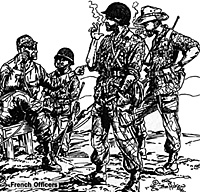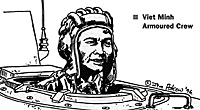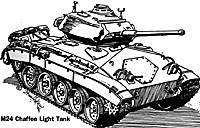A BOTTLE OF CHAMPAGNE
From 1st April on, till the end of the battle, three other paratroop battalions (2/1 RPC, 2BEP and 1 BPC) would be dropped as reinforcements, together with 1,520 individual volunteers, almost half of them making their first parachute-jump. These new arrivals were hardly sufficient to replace the losses that averaged 50 men each day. Still, the French were able to launch a limited counter-attack on 9th April and retake Eliane 1. Even mail was dropped fairly regularly. A Moroccan sergeant got official permission to make a pilgrimage to Mecca. But the Paris Bureaucrats id not explain how he could get out of the valley.
 On 16th April, de Castries was promoted to general and Pierre Langlais to colonel. De Castries' insignia of general and the accompanying bottle of champagne were dropped over the valley, but fell into Viet Minh hands. This mishap illustrated the hopelessness of the French position. After the dropping of 1 BPC, there were no more paratroop battalions available to reinforce the garrison. "Operation Condor," the offensive to reach Dien Bien Phu over land from friendly Laos and to cut a way out for the garrison, failed. the relief column, only three battalions strong, was stopped 40 miles from Dien Bien Phu. De Castries had ordered his staff to plan "Operation Albatross," an attempt to break out with the whole garrison, but he got no permission from Hanoi.
On 16th April, de Castries was promoted to general and Pierre Langlais to colonel. De Castries' insignia of general and the accompanying bottle of champagne were dropped over the valley, but fell into Viet Minh hands. This mishap illustrated the hopelessness of the French position. After the dropping of 1 BPC, there were no more paratroop battalions available to reinforce the garrison. "Operation Condor," the offensive to reach Dien Bien Phu over land from friendly Laos and to cut a way out for the garrison, failed. the relief column, only three battalions strong, was stopped 40 miles from Dien Bien Phu. De Castries had ordered his staff to plan "Operation Albatross," an attempt to break out with the whole garrison, but he got no permission from Hanoi.
The French also hoped for direct American intervention: "Operation Vulture" was planned- massive night raids of American superbombers (B29s) against the Viet Minh-positions. They could have destroyed the best troops of Giap and all his heavy weapons. It could have turned the tide. But at that time, the Americans did not want to get involved in what they called "a second Korea." There were too many imponderables. Was it possible for the superbombers to destroy the Viet Minh without hitting the French garrison? What if the bombers were shot down by Chinese MiGs wearing Viet Minh markings? What if China sent masses of "volunteers" over the border, as it had done in Korea? American support was limited to a donation of 82,000 parachutes and the use of a few more C-119 transport planes. In all fairness: the Americans were by then also contributing almost three quarters of the French cost of the war. Without this American support, the French couldn't have carried on the war as long as they did.
 For some ten days, Giap had not ordered any new attacks. The first month, the Viet Minh-army had lost 10,000 killed and wounded. Morale was affected. Giap requested 25,000 recruits and more anti-aircraft guns to replace his losses. The new "bodoi" were very young and had received only minimal training. Some of them even deserted to the French!
For some ten days, Giap had not ordered any new attacks. The first month, the Viet Minh-army had lost 10,000 killed and wounded. Morale was affected. Giap requested 25,000 recruits and more anti-aircraft guns to replace his losses. The new "bodoi" were very young and had received only minimal training. Some of them even deserted to the French!
A CHANGE OF TACTICS
Giap changed his tactics. Instead of launching new human-wave-attacks, he now picked off the strongpoints one at a time by digging trenches towards and around the French positions, so that reinforcements and supplies could no longer get through and the defenders became exhausted. The battle became one of sieges within sieges. With ammunition in such short supply, the French had to limit their fire, though they could see the Viet Minh digging.
In the meantime a conference between the major powers was planned in Geneva. The summit would resolve the Korean stalemate and decide Indo-China's fate. It was now important for the Viet Minh to strengthen their bargaining position by defeating the French as quickly as possible. From 18th April on, the Vietnamese started a new series of assaults. On 22nd April, "Huguette 1" fell. An attempt by 2 BEP to retake this lost strongpoint failed, with the battalion pinned on the airstrip and losing 150 out of 380. A wounded lieutenant shot himself dead to prevent his men risking their lives to bring him into cover.
By now, the defenders were on half rations and finally on hardly any rations at all. With the numbers of combat infantry shrinking every day, the survivors had no opportunity to rest or to recover. to add to the miser, the river flooded over. In some positions, soldiers were in the mud up to their belts (and many strongpoints were further weakened). In these extreme circumstances, the Legion celebrated Camerone Day (30th April).
THE FINAL ATTACK (1ST-7TH MAY)
On 1st May, Labour day, the Viet Minh trenches were decorated with red flags. But it wasn't going to be much of a holiday. In the evening, Giap ordered the attack. The defenders of Dominique 3, a handful of loyal T'al and Algerians, were swept away. A few hours later, Eliane 1 was lost. the last reinforcements were dropped on 3rd May. Asked for his motivation to join a lost battle, Lieutenant Staub of the 1 BPC answered: "You know, we paratroopers are like this. We win together or we die together." In the evening of 4th May, the last resistance on Huguette 4 was destroyed. The next day, the desertion of some Moroccan infantry severely weakened Claudine.
 On 6th May, Giap concentrated 100 guns and 30 battalions for what he considered to be the final attack. The French had hardly 2000 combat-infantry left, spread out over a handful of strongpoints (Claudine and Parts of Eliane). The French position was now reduced to the size of a baseball field. There were 1700 wounded in the hospital. At noon, a massive Viet Minh bombardment started. At 18:00, the Viet Minh infantry went forward. Almost immediately, several strongpoints were lost. Fighting went on the whole night. A 100-strong "battalion" of Foreign Legion paratroopers mounted counter-attacks to hold off the enemy at Eliane. In the meantime, the whole western side of the camp was held by no more than 80 paratroopers. On 2nd May, at 7:00 a.m. the Viet Minh engineers exploded a mine on Eliane 2, sweeping away a whole company of defenders. The commander of Eliane 2 asked for reinforcements. The answer was bitter: "There are not more reinforcements to send. You are a paratrooper. You are there to die."
On 6th May, Giap concentrated 100 guns and 30 battalions for what he considered to be the final attack. The French had hardly 2000 combat-infantry left, spread out over a handful of strongpoints (Claudine and Parts of Eliane). The French position was now reduced to the size of a baseball field. There were 1700 wounded in the hospital. At noon, a massive Viet Minh bombardment started. At 18:00, the Viet Minh infantry went forward. Almost immediately, several strongpoints were lost. Fighting went on the whole night. A 100-strong "battalion" of Foreign Legion paratroopers mounted counter-attacks to hold off the enemy at Eliane. In the meantime, the whole western side of the camp was held by no more than 80 paratroopers. On 2nd May, at 7:00 a.m. the Viet Minh engineers exploded a mine on Eliane 2, sweeping away a whole company of defenders. The commander of Eliane 2 asked for reinforcements. The answer was bitter: "There are not more reinforcements to send. You are a paratrooper. You are there to die."
At 7th May in the morning, de Castries proposed his officer (and their men should attempt a breakout towards Isabelle while he remained with the wounded. The hardened paratroop-officers realised that this attempt could only lead to disaster. Too proud to capitulate, de Castries sent a message to Giap that "the garrison would stop firing at 17:30." The result was of course the same. A few minutes after 17:30, thousands of Viet Minh infantry ran towards the centre of the camp. At 17:40, a Viet Minh-flag was hoisted on the French command-bunker. That night, the 600 remaining defenders of Isabelle left their positions and in small groups tried to reach the French lines in Laos. Only 70 would succeed. The battle for Dien Bien Phu was finally over.
THE LAST ACT
The French had lost 1,293 killed, 1,693 missing and 11,700 prisoners (of which 5,234 were wounded). Viet Minh losses were 7,890 killed and 15,000 wounded. When the news of the fall reached Paris, the French capital went into mourning. All television and radio went off the air to be replaced by Berlioz' requiem. For the French garrison, there was one last murderous act to play. Although after ten days of bargaining, the Viet Minh allowed some 900 seriously wounded to be helicoptered out to French hospitals, the 10,800 survivors of the garrison, (including the less seriously wounded), were marched off to "re-education-camps" near the Chinese borders, 400 miles away. In the next four months, almost 80% of them would die on the marches or in the camps.
Despite the loss of Dien Bien Phu, Navarre was eager to continue the war. He argued that the French could more easily replace their losses than Giap, who had lost almost all of his veteran troops and who now had all his guns in the middle of the jungle. Navarre was probably right, but the French politicians were tired of a war which, in the end, they could not win. The French delegation at the Geneva conference sued for peace. The war in Indo-China officially ended on 21st July 1954 at 03:43 Geneva time. The heroic resistance of the Dien Bien Phu garrison proved to be of little value at the conference table. Vietnam, Laos and Cambodia would get full independence. Laos and Cambodia were to be neutral and demilitarised. Vietnam was "temporarily" split in a Viet Minh-controlled North and a American-oriented South. Almost a million Northern Vietnamese fled to the South. The First Indo-China War was over. The Second was about to begin.
Back to Dien Bien Phu (Part 1: section 1)
To Dien Bien Phu (Part 2 in Volume 1 Issue 5)
Back to Battlefields Vol. 1 Issue 4 Table of Contents
© Copyright 1996 by Partizan Press.
This article appears in MagWeb (Magazine Web) on the Internet World Wide Web.
Other military history articles and gaming articles are available at http://www.magweb.com